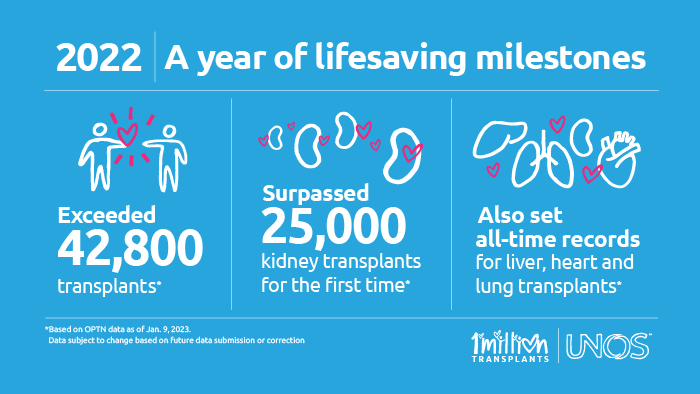Organ donation from deceased donors continues 12-year record-setting trend
In brief:
- More than 42,800 organ transplants performed in 2022, again setting annual record
- Total kidney transplants exceeded 25,000 for the first year ever
- Annual records also set for liver, heart and lung transplants
- Deceased donation continues 12-year record trend
In 2022, 42,887 organ transplants were performed in the United States, an increase of 3.7 percent over 2021 and a new annual record, according to preliminary data from United Network for Organ Sharing (UNOS), which serves as the national Organ Procurement and Transplantation Network under federal contract.
Also for the first year ever, more than 25,000 kidney transplants were performed in the United States. The total of 25,498 marked an increase of 3.4 percent over 2021. In addition, annual records were set for liver (9,528), heart (4,111) and lung (2,692) transplants.
“In a year that we commemorated one million transplants performed nationwide, we are glad to mark accelerated progress toward the next million,” said Jerry McCauley, M.D., M.P.H., president of the UNOS Board of Directors. ”We thank all the living and deceased organ donors, as well as the loved ones of deceased donors, who have provided a lifesaving gift. We also honor all the clinicians and professionals involved in organ donation and transplantation, who work tirelessly to make as many transplants happen as possible every day.
“We also should rededicate ourselves to meeting the continuing need,” added Dr. McCauley. “Many people still wait anxiously for a life-giving transplant. We must continue to improve in our capabilities to give them this vital opportunity by ensuring use of as many donated organs as possible.”
Deceased donation trends
A total of 14,903 people became deceased organ donors nationwide in 2022, representing the twelfth consecutive record year for deceased donation and an increase of 7.5 percent over 2021.
As the medical criteria for deceased organ donation continue to broaden based on favorable clinical experience, increasing proportions of donors come from less traditional categories of eligibility. In 2022, 4,776 people donated after circulatory death (DCD donors) as opposed to brain death, representing an increase of nearly 14 percent over the 2021 total. There were 5,789 deceased donors aged 50 or older, the first time there have been more than 5,000 donors of that age range in a single year.
Increases in donation occurred in many areas throughout the nation. Of 57 organ procurement organizations (OPOs)*, 42 (73.6 percent) experienced an increase in donation over their 2021 total. Two-thirds of all OPOs (38 total) set all-time records in 2022 for donors recovered in a single year.
Living donation trends
A total of 6,466 people became living organ donors in 2022, slightly fewer than in 2021. Living organ donation has varied considerably over the last several years, reflecting various trends in transplant need and the circumstances where living donation is an option. The all-time record of 7,389 in 2019 was followed by a decrease to 5,726 in 2020, due to effects of the COVID-19 pandemic.
While most living donors provide a kidney for transplant, an increasing number of people donate a segment of their liver. In 2022, there were 603 liver transplants involving living donors, an annual record and an increase of nearly 6 percent above the total in 2021.
*Note: Throughout 2022, there were 57 organ procurement organizations (OPOs) nationwide. Due to an OPO merger that took place in January 2023, there are now 56 total organizations, and data beginning in 2023 will reflect the new total.
Access transplant and donation statistics
UNOS collects and reports data on every U.S. organ donor, transplant candidate, recipient and outcome. View data and trends

